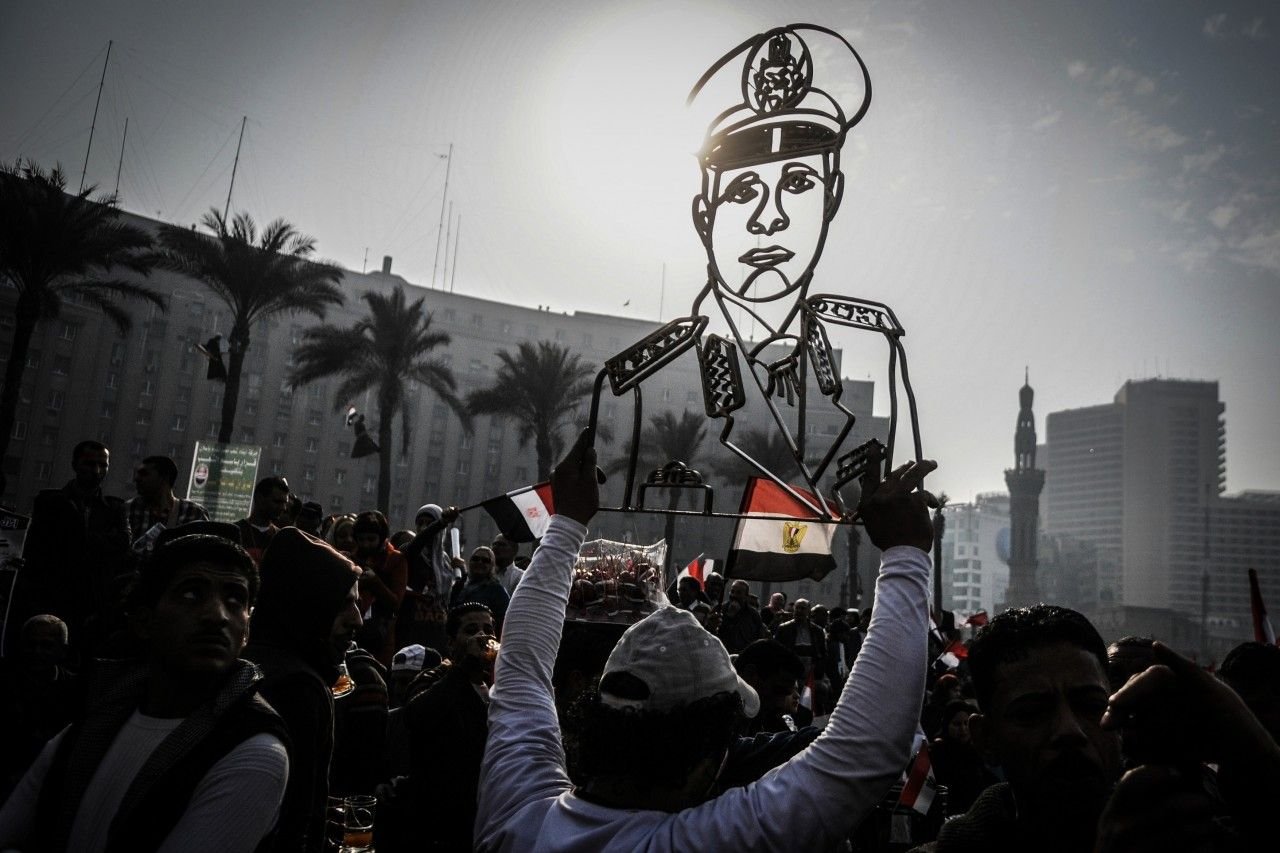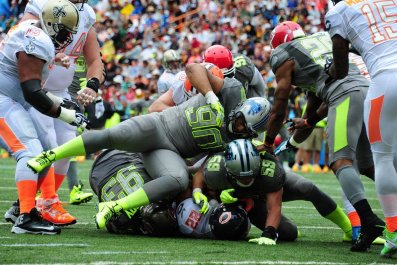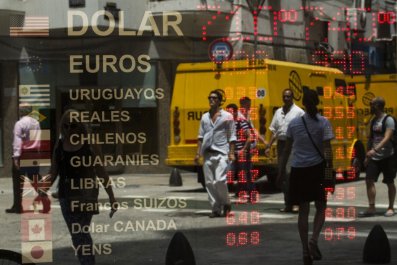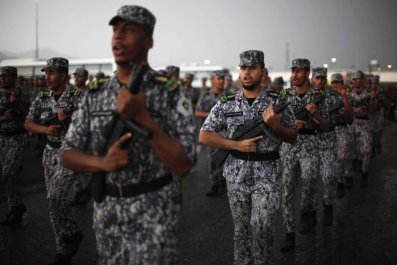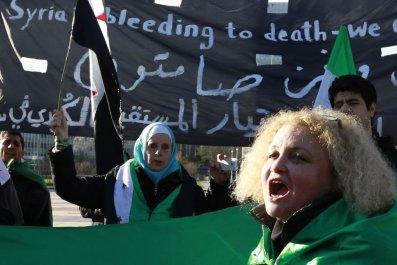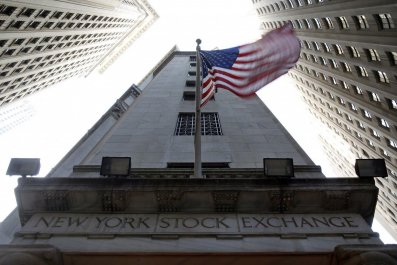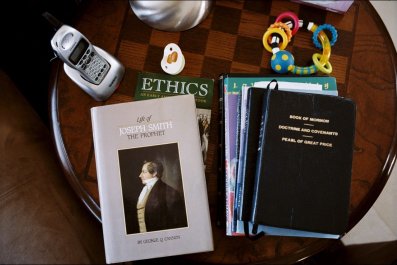The name of the Arab world's most populous country, which also happens to be the second largest recipient of American foreign aid, barely passes the lips of Washington foreign policy elites. But three years after overthrowing its latest pharaoh and becoming a symbol of hope for the region, Egypt is a mess.
As the country's current ruler, army chief Abdel Fatah al-Sisi, engages in an ever-escalating battle against Islamists and uses some unsavory tactics that are hard for Westerners to stomach, and as Islamists with distinct ill will toward Western values make strategic gains in the Sinai while the Muslim Brotherhood tries to regain its footing in the streets of Cairo, America's silence about Egypt is deafening and, some argue, works to strengthen the Islamists.
"The Muslim Brotherhood tried to take the country away from its basic values of hope and progress," former British prime minister Tony Blair told Egyptian television this week. "The army have intervened, at the will of the people," he added, so "we should be supporting the new government in doing that."
President Obama, who in June 2009 picked Cairo University as a perch for his call to launch "a new beginning" for America's relations with Arabs and Muslims, could not muster even a single word about Egypt in his Tuesday state of the union address. Last week, when Secretary of State John Kerry attempted to convince world leaders at Davos, Switzerland, that America remains engaged in the Middle East, he talked about Syria, Iran and the Palestinian-Israeli process - but failed to even mention Egypt.
Meanwhile, this was a fateful week for a country that three years ago became a harbinger of what was at first optimistically dubbed an Arab Spring:
● Over the weekend an unprecedented series of car bombings, widely believed to be the handiwork of Islamist terrorists, as well as street clashes in their aftermath, left 49 people dead in downtown Cairo.
● On Tuesday, al-Sisi promoted himself from the rank of general to field marshal and officially announced he would run for president later this year in an election he is widely expected to win easily.
● Mohamed Morsi, the Muslim Brotherhood's leader who was ousted by al-Sisi last year under pressure from street protesters, was put on trial and later forced into a glass cage in the courtroom after berating and ridiculing the presiding judge.
● A top interior ministry and police official, General Mohammed Saeed, was assassinated in downtown Cairo.
● Marking a major escalation in lawless Sinai, an army helicopter was downed for the first time, as a video showing the incident from the point of view of a man carrying a shoulder-mounted portable air defense system was posted on the web. The weapon, likely smuggled in from Libya, indicates the wealth of arms now possessed by the various Al-Qaeda-affiliated groups that control major swaths of the strategic peninsula.
As Egypt heads toward an increasingly deadly clash between the military and Islamists, including the now-outlawed Muslim Brotherhood, American officials, if at all, mostly criticize the army's non-democratic tactics.
When Cairo charged 20 Al Jazeera journalists this week, the U.S ambassador to the U.N., Samantha Power, posted a tweet: #Egypt's detention of Al Jazeera journos shows disregard for rights. Ability to exercise basic freedom essential for sustainable transition.
But with an ever-escalating whirlwind of events, Egyptians are tiring of the lofty democratic goals espoused by Washington. After three years of turmoil, many try to catch their breath and yearn for a moment they can buy a loaf of bread in downtown Cairo without fear of being blown to smithereens.
Even Egypt's most ardent advocates of democracy, therefore, acknowledge that al-Sisi will likely become the country's next elected president. "After three years of a lack of security and a terrible economy, a reasonable segment of the population is willing to give up some degree of democracy and trade it for stability, allowing the economy to work again," said Khaled Dawoud, a spokesman for the liberal Hizb al Dostour, or constitutional party.
Nevertheless, Dawoud, a former journalist, questions whether al-Sisi's crackdown on political opponents - largely aimed at the Muslim Brotherhood, but also targeting academics, journalists and liberal activists - will actually work.
"I doubt that depending on security measures alone will restore stability or [shore up] the economy," Dawoud told me this week. A frequent critic of both the military and their predecessors in power, the Muslim Brotherhood, he said, "We need to stick to the concept of building a democratic state" because "violence just breeds more violence."
Late last year, Dawoud, a widely recognized leader in the pro-democracy movement that ignited the 2011 revolution but is now politically marginalized, found himself at the sharp end of Cairo's ever-escalating violence when he was stabbed by an assailant while driving through a throng of marchers supporting the jailed Morsi.
Morsi, elected president as the head of the Muslim Brotherhood in June 2012 and ousted by al-Sisi last summer, was put on trial this week in Cairo for colluding with Palestinian and Lebanese militias. The proceedings, and specifically Morsi's antics and outbursts against the presiding judge, highlighted the lack of judicial decorum - let alone justice - in Egypt's courts.
Washington seems to be dumbfounded by the rush of events. As Tahrir Square first erupted in 2011, the U.S. briefly supported President Hosni Mubarak, but then quickly shifted to the demonstrators who ousted him. Since then many Cairenes came to believe that America backs Morsi and the Islamists. And, in what seems to be the latest policy shift, Washington now is mostly mum about Egypt altogether.
"What happens in Egypt matters to us," says Tamara Cofman Wittes, who served as deputy assistant secretary of state for Near Eastern affairs under President Obama until 2012. Washington's mistake in the past was repeatedly focusing on "the figures in powers at the moment," says Wittes, now director of the Brookings Institution's Saban Center for Middle East Policy.
"America's interests in Egypt rely first of all on Egyptian stability - but stability can not rely on repression," she adds.
Unlike the years before the overthrow of Mubarak, Wittes says, Egypt today is polarized and diverse, and therefore can no longer "be controlled by one guy at the end of the telephone." Instead, she advocates engagement with wider segments of Egyptian society, including the Muslim Brotherhood.
Others, however, applaud al-Sisi's fight against Morsi and the Islamists. Egypt historian Raymond Stock, a former Drew University assistant professor now with the Middle East Forum, criticizes some excess in al-Sisi's crackdown, including actions against fellow academics. (Stock lived in Egypt for 20 years and is writing a biography of Naguib Mahfouz, the country's Nobel laureate in literature.) Nevertheless, he says that al-Sisi's fight against the Muslim Brotherhood is legitimate and in line with American interests.
"We shouldn't be confused about the crackdown," said Stock, adding that America should accept a "slow" approach to democratization. "We must remember that al-Sisi's measures against the Islamists are part of a war that's fought against a determined and well-armed enemy," he says.
Obama, Stock believes, "should express his warmth and appreciation to the Egyptians for overthrowing the Muslim Brotherhood, who are our enemies too." So yes, he added, while some American nudging about heavy-handed tactics and calls for more protection for the endangered Christians, Shiites and other minorities can be done behind closed doors, public criticism, thanks to Obama's support of the Muslim Brotherhood, just angers the Egyptian public further.
Critics say America no longer counts in Egypt. As some of Washington's annual $1.3 billion military aid to Egypt is temporarily suspended, Saudi Arabia and other gulf countries are stepping in, contributing up to $12 billion so far in support of al-Sisi and the army.
Egypt's economy, large chunks of which is controlled by army generals, desperately needs restructuring if al-Sisi, or any other leader, ever hopes to turn it around. But for now cash from the gulf - which unlike American aid comes with few strings attached - will do.
Ever since the 1967 war with Israel, when the Soviet-equipped Egyptian army was humiliated, Cairo sought to build its military might on American-made arms, training and technology. But now al-Sisi begins to use gulf money to buy military wares from Russia.
Nevertheless, Washington can still carry a lot of influence in Egypt, even beyond the circles of American-trained army generals who are now in power.
America still cooperates on security matters with Egypt, especially (along with Israel) in the war against the Islamist terror groups in the strategic Sinai. According to Wittes, that, and aid, will not suffice. "Influence is not just how much cash you put on table," she says, and notes that all Egyptian leaders and political factions still seek a nod of approval from the "world's leading power, the United States."
But as of now, America seems to have lost interest in a country where almost a quarter of all Arabs live, which has served as a cornerstone of U.S. policy in the Middle East ever since Henry Kissinger managed to pull it away from the Soviet Union's sphere.
Follow Benny Avni on Twitter: @bennyavni


